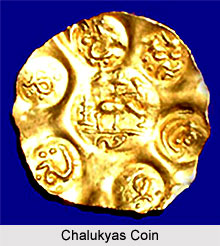 King was the highest officer of the state. According to some scholars the kings enjoyed unlimited powers but other scholars do not agree with this view. But undoubtedly it can be said that most of the Chalukya kings worked for the welfare of the people.
King was the highest officer of the state. According to some scholars the kings enjoyed unlimited powers but other scholars do not agree with this view. But undoubtedly it can be said that most of the Chalukya kings worked for the welfare of the people.
The chief queen of the king was called `Tattamahish`. The prince was appointed on the post of Yuvaraja. King was the highest judicial authority and was the head of the administrative council. Kings ruled in accordance with the rules of their dynasties. Kings used to seek the advice of other experienced persons in matters of administration, and other related programmes, etc.
Council of ministers and other officers: There was a council of ministers to advise the king and to help him in administration. The chief of prime minister was called Mahamatya.
Besides ministers there were other officers who helped the king in administration of the state. The administration of Mandal was called Mahamandaleshwara. The chief of the army was called Dandadhipatya. The heads of the village and law department were called Visayika and Adhishthanaka. Kanaka, Dandanayaka. Sandhivigrahika, Dutaka, Mahakshapatalika were other officers as well.
Provincial administration: The entire empire was divided into provinces and other units. Mandal was the unit of the empire and its administrator was called Mahamandateshwara. He supervised and controlled his subordinate officials. He had also the power to either punish or promote them. Village was called Visha and its head was called Vishayaka. There were other officials under him. A special official called Pattaiika was appointed for the realization of revenue.
Local administration: The entire empire was divided into villages. The villages were locally administered by gram sabha and gram panchayat. Its head was called vishayaka. Like villages, city councils were also entitled for local and self administration.
Military organization: Chalukya had `Chaturangini` or four winged army. A great importance was attached to the army of elephants. King was the supreme commander of the army. Danda Nayaka or Dandadhipatya performed the duties of Senapati. Sometimes king himself led the army whereas sometimes some senapati was sent to lead the military campaign. Samantas maintained their separate armies and helped their icings as and when their help was required.
Judicial system: There were separate military and civil courts during the reign of Chalukyas. King was the highest judicial authority and gave his decision in accordance with conventions and on the advice of his ministers. All sorts of punishments such as imprisonment, exile, fines and sentence to death etc. were prevalent in his period. Vichaipati and adhisfhanayka were important officials in the field of justice.
Sources of revenue and expenditure: Land revenue was main income of the state. Land revenue was charged at the rate of 1/6 of the production. It was the duty of the Pattaiika that the revenue thus charged should reach the government treasury.
Besides land tax there were other sorts of taxes such as Xutanamaka, which is known as a tax for pilgrimage, tax on prostitutes, etc. Fine imposed by the courts also formed the revenue of the states. Law of `transferred property` was applied for the property of a person who died without leaving a son. That is to say that property was confiscated by the state. Meadows, forests, mines etc. were also the means of the income of state. Taxes on different trades also formed a considerable part of the income of the state as well.
Expenditure of the state was made on the some items which can be mentioned below.
•King and his servants.
•Construction works.
•Charities to temples, etc.



















